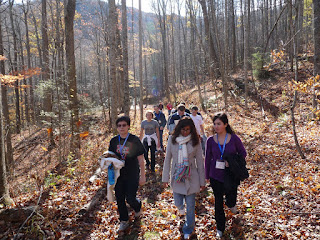Today we celebrate the end of the Church's liturgical year, the last Sunday before we enter the Advent season, and the start of a new year for the Church. The readings last Sunday focused on Christ's return at the end of time; as we move into Advent the readings will continue to look forward to Christ's second coming for a couple of weeks until we shift gears and begin to look back to His first coming as a babe in Bethlehem, in anticipation of the Christmas celebration. But regardless of whether we are speaking of His coming at the end of time, or his coming as a newborn in a manger, we speak of his arrival as that of a King. And so it is fitting, as we cap off the liturgical cycle, to have one final, grand celebration of Jesus Christ, the King of the Universe.
However, this is not some ancient feast, first celebrated 1600 years ago in Antioch or Ephesus. Christ the King is actually a very modern celebration, first being instituted in 1925 by Pope Pius XI. He did so as a way of combating secularism. Secularism is essentially living your life as if Christ did not matter. Pope Pius XI wanted to remind us that Christ absolutely did matter -- not just when we attend Mass on Sunday, but every day, every hour of our lives, in every aspect of our lives. Christ is King of the Universe -- all space and time, in all its aspects.
Today's celebration is meant to remind us of certain things. First, Christ is the creator of the universe. All things were made by Him, and so all things belong to Him. Second, that Christ is our redeemer and has purchased us with His very Body and Blood. We belong to Him. Third, He is head of the Church. And lastly, that God has bestowed upon Christ all the nations on earth; all are in His care. In other words, there is no limit, either in time nor space, to Christ's sovereignty. "I am the Alpha and the Omega" says the Lord. The beginning and the end.
We should not think of Christ as being like earthly rulers -- the royalty and politicians that we know and see on the news. Rather, our worldly leaders should try to be like Him in their leadership. Our earthly kings resemble Christ in their kingship in the same was that the artist resembles God in His creating power. The artist creates, and in doing so shares in some small way a character of God the Creator. But the painting, sculpture, or poem is a small, dim reflection of the glory of Creation itself. And so our worldly leaders, at their best, are still dim reflections of the benevolent and eternal kingship of Jesus Christ.
Jesus exercises His kingship with the heart of a shepherd. While the readings at today's Mass speak of glory and power and dominion (and rightly so), the prayers offered in the Liturgy of the Hours show us what kind of King we have in Christ. The intercessory prayers from the morning office begin, "Christ, you are our savior and our God, our shepherd and our king, lead your people to life-giving pastures." And they continue, "Good Shepherd, you laid down your life for your sheep, rule over us, and in your care we shall want for nothing."
Christ is a majestic King, ruling over the cosmos from all eternity. He is also a shepherd who does not want even one lamb to go astray. Today we should rejoice, for we have such a powerful and loving Lord.
-----
The Church gives us an opportunity this day to gain a plenary indulgence -- that is, a remission before God of all the temporal punishment due for sin which has already been forgiven (when our sins are forgiven in the sacrament of Confession, the eternal punishment for those sins is remitted, but there may be temporal punishment still due us. It is this temporal punishment that is paid in purgatory). To gain a plenary indulgence, one must be in a state of grace, have recently gone to confession, receive the Eucharist, and pray for the intention of the Pope. These things are generally done on the same day as the indulgenced act, but can be done "within several days" (according to Canon Law). To gain the indulgence today, the Church asks us to make a public recitation of this prayer.
Most sweet Jesus, Redeemer of the human race, look down upon us humbly prostrate before you. We are yours, and yours we wish to be; but to be more surely united with you, behold each one of us freely consecrates himself today to your Most Sacred Heart. Many indeed have never known you; many, too, despising your precepts, have rejected you. Have mercy on them all, most merciful Jesus, and draw them to your Sacred Heart. Be King, O Lord, not only of the faithful who have never forsaken you, but also of the prodigal children who have abandoned you; grant that they may quickly return to their Father's house, lest they die of wretchedness and hunger. Be King of those who are deceived by erroneous opinions, or whom discord keeps aloof, and call them back to the harbor of truth and the unity of faith, so that soon there may be but one flock and one Shepherd. Grant, O Lord, to your Church assurance of freedom and immunity from harm; give tranquility of order to all nations; make the earth resound from pole to pole with one cry: Praise to the divine Heart that wrought our salvation; to it be glory and honor for ever. Amen.

WCU Catholic Campus Ministry
Matthew Newsome, MTh, campus minister
(828)293-9374 | POB 2766, Cullowhee NC 28723











